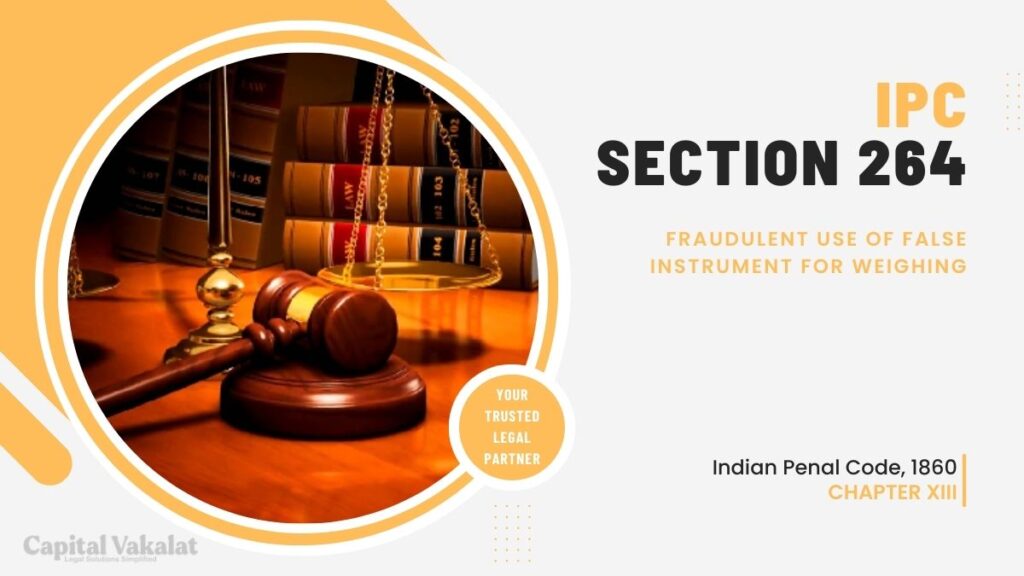Section 264 of the Indian Penal Code (IPC) deals with the fraudulent use of false instruments for weighing. This legal provision plays a crucial role in upholding the integrity of trade and commerce by ensuring that instruments used for weighing are accurate and not manipulated for fraudulent purposes.

In this article, we will delve into the specifics of Section 264 IPC, understanding the elements of the offense, legal provisions, penalties, and its relevance in today’s society.
Understanding Fraudulent Use of False Instrument for Weighing
Fraudulent use of a false instrument for weighing refers to the act of using an instrument that is manipulated or tampered with to misrepresent the weight of goods or produce. Such instruments could include scales, balances, or any other device used to measure the weight of objects.
Legal Provisions Under Section 264 IPC
Section 264 IPC lays down the legal framework for dealing with cases involving the fraudulent use of false instruments for weighing. It outlines the following key aspects:
- It makes it an offense to knowingly use a false instrument for weighing.
- It prescribes penalties for individuals or entities found guilty of such fraudulent activities.
- The section is designed to protect the interests of consumers, businesses, and society as a whole.
Elements of the Offense
To establish an offense under Section 264 IPC, several elements must be present, including:
- Knowledge of the instrument being false or tampered with.
- The intent to use the false instrument for fraudulent purposes.
- Actual use of the instrument for weighing in a fraudulent manner.
Penalties and Punishments
Individuals or entities found guilty under Section 264 IPC may face penalties and punishments, which can include fines and imprisonment. The severity of the punishment depends on the specific circumstances of the case, the extent of the fraudulent activity, and the harm caused to society.
Judicial Interpretations
Several judicial decisions have provided insights into the interpretation of Section 264 IPC. These decisions have helped clarify the scope and application of the law, ensuring that justice is served.
Relevance and Impact on Society
The relevance of Section 264 IPC in modern society cannot be understated. Accurate weighing is essential in various industries, such as agriculture, manufacturing, and retail. The law helps maintain trust in trade and commerce, protecting consumers from being deceived and businesses from unfair competition.
Challenges and Controversies
While Section 264 IPC serves a crucial purpose, it is not without its challenges and controversies. Enforcement can sometimes be difficult, and there may be debates about what constitutes a false instrument for weighing in certain cases.
Preventing and Combating Fraudulent Activities
Preventing fraudulent activities under Section 264 IPC involves regular inspections, calibration, and certification of weighing instruments. Businesses and individuals can also play their part by ensuring the instruments they use are legitimate and not tampered with.
In conclusion, Section 264 IPC is a vital provision within the Indian Penal Code that safeguards the interests of both consumers and businesses. By addressing fraudulent use of false instruments for weighing, it upholds the principles of fairness and integrity in trade and commerce. To maintain a just society, it is essential that such legal provisions are enforced and adhered to.
Frequently Asked Questions
How can businesses protect themselves from inadvertently using false instruments for weighing?
Regular maintenance, calibration checks, and using certified weighing instruments can help businesses ensure compliance with the law.
What is the maximum penalty under Section 264 IPC for fraudulent use of false instruments for weighing?
The penalty can vary based on the severity of the offense, but it may include fines and imprisonment.
Are there any exemptions under Section 264 IPC for specific industries or situations?
The law generally applies to all industries, but there may be specific provisions or regulations that exempt certain activities from its scope.
How does Section 264 IPC contribute to consumer protection in India?
Section 264 IPC helps protect consumers from fraudulent practices by ensuring the accuracy of weight measurements during transactions, thereby promoting trust and fairness in the market.